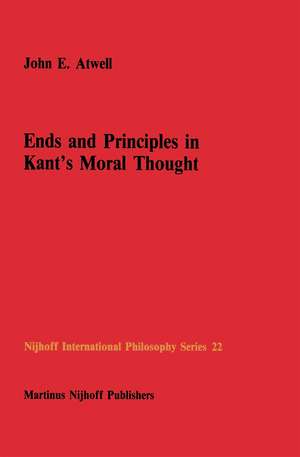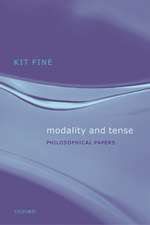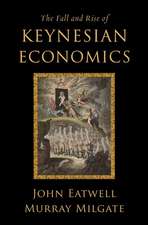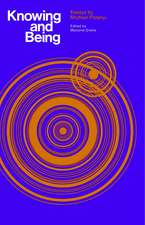Ends and Principles in Kant’s Moral Thought: Nijhoff International Philosophy Series, cartea 22
Autor John Eatwellen Limba Engleză Hardback – 31 oct 1986
| Toate formatele și edițiile | Preț | Express |
|---|---|---|
| Paperback (1) | 637.78 lei 6-8 săpt. | |
| SPRINGER NETHERLANDS – 13 oct 2011 | 637.78 lei 6-8 săpt. | |
| Hardback (1) | 644.30 lei 6-8 săpt. | |
| SPRINGER NETHERLANDS – 31 oct 1986 | 644.30 lei 6-8 săpt. |
Din seria Nijhoff International Philosophy Series
- 9%
 Preț: 900.67 lei
Preț: 900.67 lei - 5%
 Preț: 387.86 lei
Preț: 387.86 lei - 15%
 Preț: 638.89 lei
Preț: 638.89 lei - 15%
 Preț: 638.76 lei
Preț: 638.76 lei - 15%
 Preț: 643.00 lei
Preț: 643.00 lei - 18%
 Preț: 949.23 lei
Preț: 949.23 lei - 18%
 Preț: 955.70 lei
Preț: 955.70 lei -
 Preț: 381.43 lei
Preț: 381.43 lei - 18%
 Preț: 953.65 lei
Preț: 953.65 lei - 18%
 Preț: 1232.26 lei
Preț: 1232.26 lei - 15%
 Preț: 637.13 lei
Preț: 637.13 lei - 18%
 Preț: 1224.54 lei
Preț: 1224.54 lei - 15%
 Preț: 640.24 lei
Preț: 640.24 lei - 18%
 Preț: 1232.57 lei
Preț: 1232.57 lei - 18%
 Preț: 1216.95 lei
Preț: 1216.95 lei - 18%
 Preț: 953.20 lei
Preț: 953.20 lei - 15%
 Preț: 644.95 lei
Preț: 644.95 lei - 18%
 Preț: 952.09 lei
Preț: 952.09 lei - 15%
 Preț: 642.03 lei
Preț: 642.03 lei - 18%
 Preț: 1227.21 lei
Preț: 1227.21 lei - 15%
 Preț: 639.59 lei
Preț: 639.59 lei - 15%
 Preț: 639.41 lei
Preț: 639.41 lei -
 Preț: 394.29 lei
Preț: 394.29 lei - 15%
 Preț: 641.20 lei
Preț: 641.20 lei - 18%
 Preț: 950.66 lei
Preț: 950.66 lei -
 Preț: 394.87 lei
Preț: 394.87 lei - 18%
 Preț: 952.26 lei
Preț: 952.26 lei
Preț: 644.30 lei
Preț vechi: 758.01 lei
-15% Nou
Puncte Express: 966
Preț estimativ în valută:
123.28€ • 128.73$ • 101.80£
123.28€ • 128.73$ • 101.80£
Carte tipărită la comandă
Livrare economică 15-29 aprilie
Preluare comenzi: 021 569.72.76
Specificații
ISBN-13: 9789024731671
ISBN-10: 9024731674
Pagini: 242
Ilustrații: XIII, 227 p.
Dimensiuni: 210 x 297 x 19 mm
Greutate: 0.53 kg
Ediția:1986
Editura: SPRINGER NETHERLANDS
Colecția Springer
Seria Nijhoff International Philosophy Series
Locul publicării:Dordrecht, Netherlands
ISBN-10: 9024731674
Pagini: 242
Ilustrații: XIII, 227 p.
Dimensiuni: 210 x 297 x 19 mm
Greutate: 0.53 kg
Ediția:1986
Editura: SPRINGER NETHERLANDS
Colecția Springer
Seria Nijhoff International Philosophy Series
Locul publicării:Dordrecht, Netherlands
Public țintă
ResearchCuprins
I: Introduction: Background and the central problem.- 1. Human knowledge and the knowable world.- 2. Freedom: The chief condition of morality.- 3. Types of moral theories.- 4. Ends and principles: Inconsistencies?.- II: Ends and the good will.- 1. Conditioned goods and the unconditioned good.- 2. Prima facie goods and the absolute good.- 3. The uniqueness of a good will.- 4. The irrelvance of ends.- 5. A note on respect for the moral law.- III: Maxims.- 1. Three kinds of maxims: Incentival, actional, and dispositional.- 2. Alternative accounts of Kantian Maxims.- 3. Preliminary elucidation of actional maxims.- 4. What maxims (and the adoption of maxims) are not.- 5. On formulating maxims.- IV: Universality and the categorical imperative.- 1. The general nature of imperatives.- 2. The principle of universality of nature.- 3. Suicide and lying promises.- 4. Neglect of talents and refusal to help others.- V: Ends and moral obligation.- 1. The problem of objecitve ends.- 2. Man as the objective end-in-itself.- 3. The alleged inconsistency.- 4. End which are duties.- 5. The highest good.- VI: The principle of humanity.- 1. Initial remarks.- 2. Treatment of others as means.- 3. Humanity in others as a positive end in itself: The duty of love for others.- 4. Respect for humanity in one’s own person: Duties to oneself.- VII: Autonomy of the Will.- 1. The principle of autonomy of the will as a moral criterion.- 2. Autonomy and the possibility of morals.- 3. The kingdom of ends.- 4. Responsibility for wrong acts and accountability for moral evil.- VIII: Duties, rights, and ends in the political order.- 1. The alleged right to revolt.- 2. Kant’s paradoxical stand on revolution.- 3. The alleged right to lie from benevolence.- 4. The end of nature in human history.- IX:Happiness and law-morality.- 1. Morality and happiness.- 2. Law-morality and atheism.- 3. Conclusion.
Recenzii
'... Atwell does deal with familiar topics inmuch of his work, but does so in a way that is fresh and penetrating as well as remarkably clear. ... in every chapter topics are treated in a way which admirably combines careful scholarship with a sense of what is philosophically important. ... As a work of a scholarship it seems to me to compare favourably with the best books on the subject, including those by Marcus Singer and Onora Nell.'
Prof. W.H. Walsh+, Oxford, UK
Prof. W.H. Walsh+, Oxford, UK




















